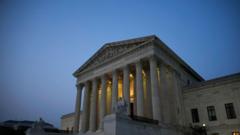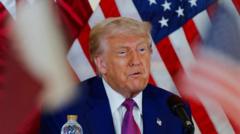As the Supreme Court weighs the legality of President Trump's executive order on birthright citizenship, legal experts and advocates highlight the potential implications for thousands of American-born children if the order is upheld.
Supreme Court Considers Trump's Controversial Birthright Citizenship Order

Supreme Court Considers Trump's Controversial Birthright Citizenship Order
The U.S. Supreme Court hears pivotal arguments regarding President Trump’s attempt to eliminate birthright citizenship for children of undocumented immigrants.
The U.S. Supreme Court is currently deliberating on President Trump’s contentious executive order aimed at abolishing birthright citizenship, a decision that could significantly impact his immigration policies. The arguments being heard today revolve around whether lower court judges possess the authority to obstruct presidential directives on a national level. Shortly after returning to the White House in January, Trump issued an executive order asserting that children born in the U.S. to undocumented immigrants would not automatically receive citizenship.
Multiple federal judges across the country have placed a hold on the order, reflecting a broader trend of courts restraining Trump’s executive actions. The president argues that these judges overstepped their bounds by issuing nationwide injunctions. If the Supreme Court rules in favor of Trump, it may empower him to leverage executive orders to realize campaign goals without needing congressional consent, while facing fewer judicial limitations.
Additionally, the Supreme Court’s session in May is a rarity, and the timeline for a ruling remains uncertain. Notably, Trump appointed three justices to this conservative-majority court during his presidency. Many legal scholars contend that the president lacks the authority to revoke birthright citizenship, which is protected by the 14th Amendment of the U.S. Constitution. This amendment guarantees that all individuals born or naturalized in the United States are citizens. Trump's claim hinges on his interpretation of "jurisdiction thereof," arguing that it excludes the children of undocumented immigrants or those present temporarily.
Federal judges from Maryland, Massachusetts, and Washington have enacted sweeping injunctions that prevent the order from being enforced nationwide, prompting the Trump administration to contest the validity of such universal injunctions in court. They assert that these limitations hinder the administration’s capacity to operationalize its agenda, viewing the injunctions as direct challenges to presidential powers.
The case stems from various lawsuits filed by immigration advocates and 22 states, with the Trump administration seeking clarification that any injunctions should only apply to the specific immigrants involved in the case or connected to the plaintiff states. This would allow the administration to partially enact its directive amid ongoing legal challenges. Since Trump's re-election, around 40 different judicial injunctions have been initiated, indicating a significant pushback against his policies.
Legal experts warn that an end, even partially, to birthright citizenship could lead to severe ramifications for tens of thousands of children, creating a scenario where they may face second-class status or jeopardizing their citizenship altogether. Immigration lawyer Alex Cuic emphasized the grim reality that some of these children could end up undocumented or stateless, raising questions about their deportability and the willingness of their parents’ home countries to accept them.
As the Supreme Court deliberates, the future of birthright citizenship hangs in the balance, amid a heated national discourse on immigration policy.




















